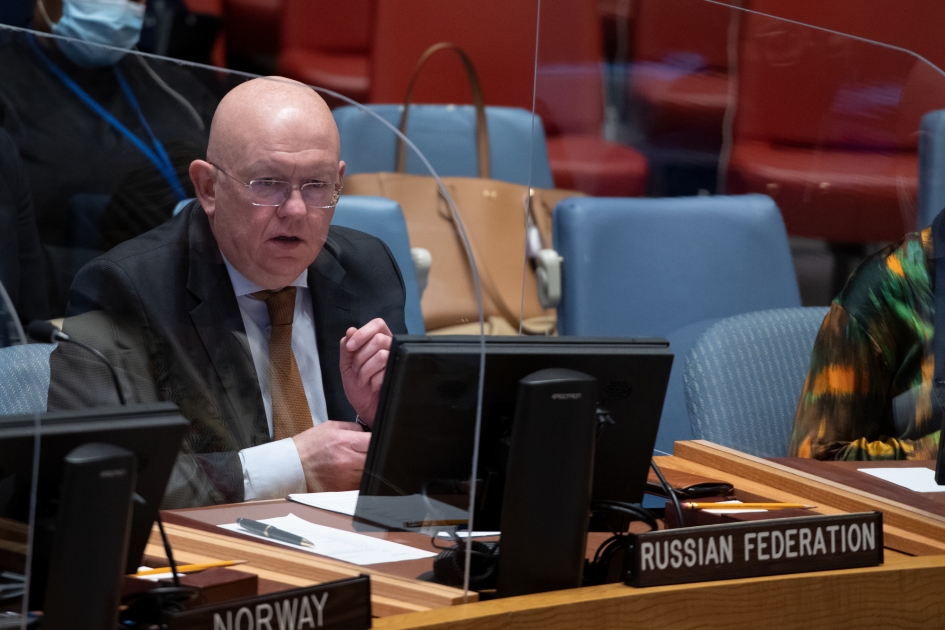Statement by Permanent Representative Vassily Nebenzia at the UNSC briefing on the situation in Afghanistan
Mr.President,
We thank the Special Representative of the Secretary-General and head of the UN Assistance Mission in Afghanistan (UNAMA) Ms. Deborah Lyons for her thoughts and views on the situation in Afghanistan. We are grateful to Ms. Freshta Karim for her poignant, emotional and brave statement. We welcome the participation of regional states in today’s meeting.
The new reality in Afghanistan established after 15 August did not bring either the Afghans themselves nor the international community any closer to a stabilization of the country or the establishment in the country of a peaceful, indivisible and drug and crime free state. Long-standing, decades-old problems remain unresolved and new challenges have emerged due to, first and foremost, a lack of international recognition.
We still support the formation of a genuinely inclusive government that adequately reflects the interests of all major ethnic and political forces in the country, as well as moderate domestic and friendly foreign policy of Afghanistan and the respect of basic human rights, including the rights of women and children. A key aim has been to eliminate the threat of terrorism and drugs and it remains relevant to this day.
We expect that the new authorities will be more astute than the previous Afghan leadership that has sacrificed national interests in favor of its ambitions and abandoned its people to the whims of fate.
We see that the Taliban are prepared to engage practically with the international community and regional partners to solve the primary challenges facing the country: bringing law and order and ensuring the country’s recovery after many years of conflict. We also see the first positive signs, in particular regarding the return of women to work in the social sector and regarding girls’ education.
We note the new authorities’ efforts to combat the Islamic State given the frequency of deadly terrorist attacks through which the Afghan wing of ISIL is trying to destabilize the situation in and outside the country. Terrorist threat is also linked to the drugs problem as drugs are the main source of terrorist financing. Today, there is a real threat of terrorist and drugs activity spilling over into the neighboring countries including activity under the cover of migrant flows. We trust that the Taliban will continue to fulfil their promises to root out this problem.
At the same time, the afore-mentioned issues coupled with poverty, food shortages and corruption are not new for Afghanistan. They were, to a large extent, “inherited” by the Taliban since they were not systematically tackled in the last 20 years.
However, as opposed to the situation a few months ago, the new authorities of Afghanistan are deprived of any sources of income at all. The banking system is paralyzed and Afghanistan does not have any available cash. Physicians, doctors, teachers and policemen are not being paid. All this is inevitably verging on the brink of a humanitarian disaster that can lead to millions of victims among ordinary Afghans.
Mr.President,
The top priority at the moment is providing Afghanistan with urgent humanitarian assistance. We commend the swift actions undertaken by the UN in this area without upsetting the established cooperation with local authorities. We support the coordinating role of the UN in consolidating the international efforts in the area of humanitarian assistance. In turn, we are also prepared to make our contribution to this joint undertaking. In the near future we will send food, medicines and basic necessities to Afghanistan. We trust that key donors will also demonstrate much-needed generosity in this critical situation.
However, we have to note that despite the scaling-up of aid through OCHA, funds and programs, social and economic problems in Afghanistan will not be resolved without unfreezing of funds through the international financial institutions. We hear this from the UN themselves who are predicting in such a case an inevitable economic collapse.
In this context, we support the involvement of UN funds and programs in the work with relevant ministries to distribute unfrozen resources to ensure uninterrupted work of different categories of civil servants providing services to the population.
It is encouraging that the positions of regional and extra regional players are very close with regards to the prevention of an economic collapse in Afghanistan. In this regard, we believe it useful to swiftly convene a representative international donor conference under the aegis of the UN with the understanding that the main burden of post-conflict economic and financial recovery and development of Afghanistan should be borne by the forces whose military contingents were present in the country for the last 20 years.
Mr.President,
The Russian Federation continues to provide direct assistance to the Afghan settlement process. The leading role here is played by the extended Troika whose most recent meetings were held on 19 October in Moscow and on 11 November in Islamabad. The Moscow format remains a unique platform for broad regional cooperation with the participation of the Afghans themselves. It was reiterated during the latest round of consultations in Moscow on 20 October.
We are in regular contact with all 5 Central Asian countries. Cooperation with regional organizations – the CSTO, the SCO, including the CSTO Working Group on Afghanistan and the resumed SCO-Afghanistan Contact Group – remains as relevant as ever.
In conclusion, we would like to reiterate our unwavering commitment to the sovereignty, independence and territorial integrity of Afghanistan. Its security and stability is in the interests of Afghans, their neighbors and the entire international community.
Thank you for your attention.
